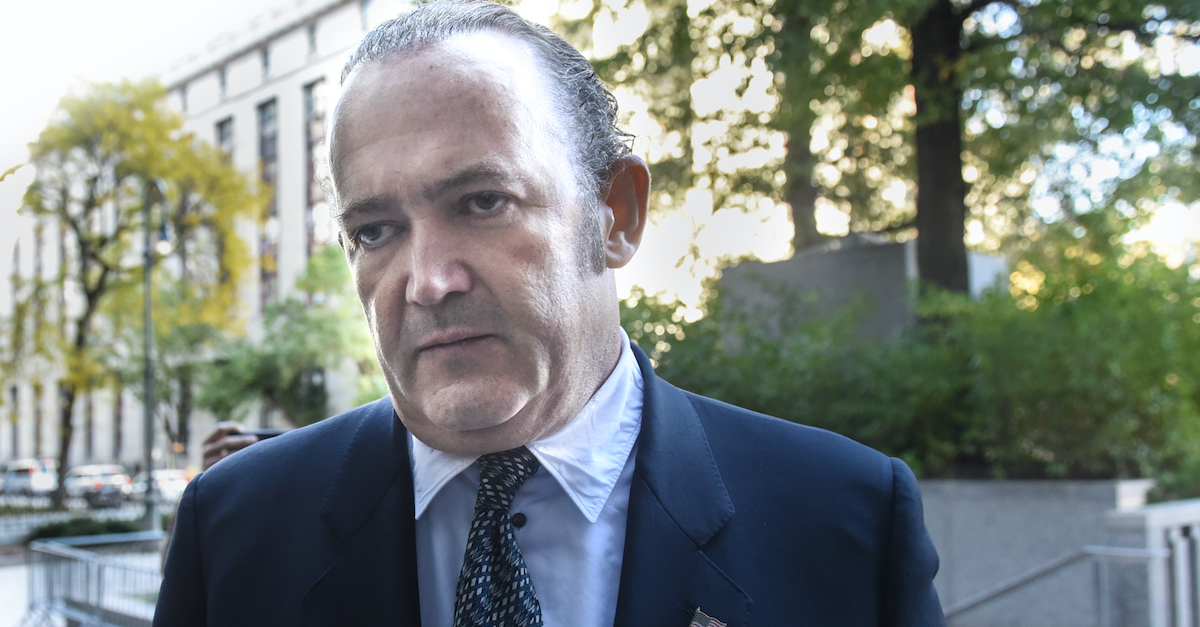
Ex-Giuliani associate Igor Fruman arrives at federal court for an arraignment hearing on Oct. 23, 2019 in New York City.
Igor Fruman, a former Rudy Giuliani ally who became a key figure in former President Donald Trump’s first impeachment, has been sentenced to a year and a day in prison for helping funnel a Russian oligarch’s money into U.S. elections.
Along with Lev Parnas—whom a jury convicted of similar allegations last October—Fruman helped solicit a $1 million donation by Andrey Muraviev into U.S. elections in order to facilitate their cannabis businesses. About $150,000 of it made it to 2018 candidates, prosecutors say.
Parnas unsuccessfully fought the allegations at trial. Fruman pleaded guilty in September to soliciting a contribution by a foreign national, telling a judge he had “little experience” with U.S. election law.
“I deeply regret my actions and apologize to the court and the United States government for this conduct,” Fruman told U.S. District Judge J. Paul Oetken last year, reading from his prepared statement.
Well before the scope of their prosecution narrowed, Parnas and Fruman were best known for allegations that they helped Trump try to discredit ex-U.S. Ambassador to Ukraine Marie Yovanovitch.
A prominent anti-corruption advocate, Yovanovitch was perceived to be a barrier to Trump’s quest to manufacture dirt on his then-rival Joe Biden by pressuring Ukraine’s president Volodymyr Zelensky to open an investigation into Hunter Biden. Trump also tried to revive a debunked conspiracy theory that Ukraine, not Russia, hacked into the Democratic National Committee’s servers. Those efforts led to Trump’s first impeachment and acquittal by the Senate.
After their arrest in 2019, Parnas and Fruman took sharply different paths. Parnas cooperated with Democrats in the House Intelligence Committee’s investigation. Fruman did not. Parnas embarked on a pre-trial media blitz of major TV, print and online interviews. Fruman kept quiet.
Parnas, along with his now-convicted conspirator Andrey Kukushkin, fought his charges before a jury. Fruman pleaded down before a judge.
The geopolitics behind impeachment scandal, which figured prominently in Parnas and Fruman’s first indictment, were ultimately stricken from the superseding indictment. Prosecutors did not mention the allegations surrounding Ukraine during Parnas’s trial.
Prosecutors had requested a 37 to 46 month term of imprisonment, calling him a “central player” in the scheme. They also claimed that he lacked “candor” in positioning himself as a devoted husband whose incarceration would burden his family.
“For example, Fruman proclaims his ‘everlasting devotion to his family and religion,’ as shown by, among other things, serving as the ‘primary caretaker’ for his wife,” Assistant U.S. Attorney Rebekah Donaleski wrote in a sentencing memo. “In fact, Fruman is separated from his wife. […] And it appears that Fruman misled the Probation Office about why: Fruman told the probation officer that they ‘separated in 2017 due to his arrest and legal situation.’ […] But in 2017, Fruman had neither an arrest nor a legal situation, because the crimes at issue here did not occur until 2018.”
CNN reported that Judge Oetken found punishment necessary for what he called a “serious offense.”
“Our democracy is fragile and it depends on people believing in it,” Oetken reportedly said.
Prosecutors from the Southern District of New York did not immediately respond to Law&Crime’s email requesting comment.
(Photo by Stephanie Keith/Getty Images)